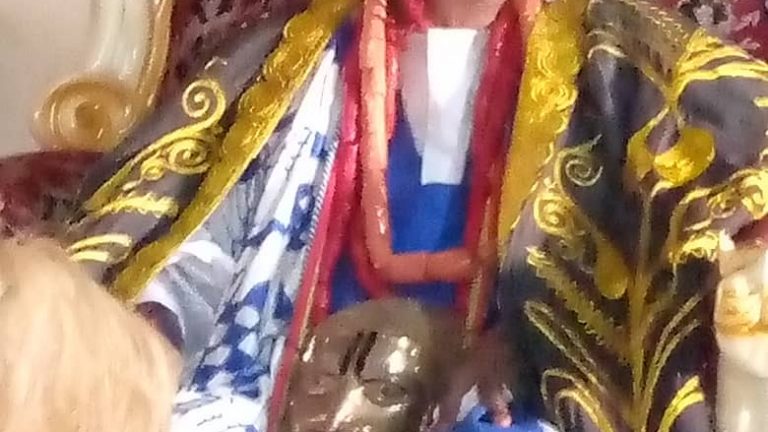For Prince Matthew Àlájì Ọ̀pàlúwa Ògwùchẹ́, Wednesday, November, 2021, a market day in the ancient town of Idah (Ídá), was an unforgettable milestone in his life, being the day he was installed the 27th Ata-Igala of the ruling Third Dynasty. A descendant of the Àámẹ-achọ Ruling House, Àlájì had, nine days earlier, commenced his pre-coronation rites at Ugwọlawo in Òfù LGA. On that day, he was conferred the preliminary Aidoko-anya title.
In his signature post-installation speech, the new Ata declared that the unity of the Igalas was uppermost in his mind; and he urged everyone, male or female, at home or in the diaspora, to join him to break new grounds in Igala development, offering himself as the rallying-point for that purpose. “Let our lips come together, so that we can whistle,” the Ata urged his subjects in a proverbial manner. Explaining, he stated that if the lips are apart, there would be no synergy, as people would be working at cross-purposes, adding that unity was a catalyst for achieving rapid development.
The new king observed that good things had already started happening in the lives of his people, as he made reference to the recent Federal Executive Council announcement that it had awarded a contract on the Idah-Ọ̀dọ́lú-Ǹsukka Road, which had been abandoned for decades.
It is customary for every new Ata Priest-King to choose new names by which he is recognized. Sometimes, these names appear in form of metaphors, proverbs, sayings and names reflecting power and strength; and which are intended to enhance his personality. From such appellations, the public could either discern or deduce his character or infer what his dispositions, philosophical bent as well as his capacities or principles might be during his life-long reign.
Responding to this royal requirement, Ata Àlájí Ọ̀pàlúwa Ògwùchẹ́, upon his investiture, released a barrage of thought-provoking, personalized aliases, which we have attempted to decode via the medium of English language. It should, however, be noted that such names couched in figurative language do not fall into everyday Igala language; therefore, they are not expect to lend themselves to direct translation or transliteration, as the case may be. Our visitors are encouraged, nonetheless, to make do with our closeness to the full meanings of these great, breath-taking aliases taken by a new king who is holding his ace to his chest.
We wish him a long, fruitful reign so that he can continue to favourably live out the essence of each of these gorgeous names:
- Àtá ajú Ògwùchẹ́-akpá, ák’íkò kì ákojí Bàbá: Àtákpá ègbò k’ì che ojínójí agbítì. Ata, the heir-apparent who replaces his fore-father, Ògwùchẹ́-akpá: the sitting-room of the weak that becomes the graveyard of the strong.
- Àtá omi k’ì gbà-gwú áwo-olí, k’ẹla abìgbà má neke mọ. Ata, the pool of rain-water inside a hole on a tree-trunk that becomes an illusory drink for a horned animal.
- Àtá àdúdẹ, k’ì ák’ebíjè dá. Ata, the pair of tongs that cuts an iron into two.
- Àtá òbútù mẹ̀mẹ̀, k’ì ájẹ agbà igẹ́. Ata, the pair of bellows operated with minimum force that consumes a basket of charcoal.
- Àtá anẹ́-ádú yẹ̀yẹ̀, k’ì má kp’adù fọ́. Ata, the gentle load-carrier that never allows his load to fall and break.
- Àtá àlápa tìkà-tìkà: ùnẹ̀dọ̀ k’ì ádu ẹñwu jẹ kwó éjú-uná. Ata, the fearless pair of pliers that takes its food from an open fire.
- Àtá ùlòkò k’ì nó éjú-ugbá, k’ì má nẹ ùmájáà. Ata, the red feather of the Crested malimbe displayed among wares that never hides from public view.
- Àtá òlùbọ ẹnẹ k’ì má jẹ̄ àkẹ̀chẹ̀. Ata, the shadow of a human being that cannot be pushed in any way.
- Àtá ogwu kù mà néjú ọgbá, k’ì ájẹ ẹnẹ lè ùbì. Ata, the war that was anticipated in a frontal location that preys on the enemy from behind. THE KING’S GENDER-BASED SALUTATIONS: Menfolk greet him: Ágáábáìdù!!! The women greet him: Ámidééjú!!!









Awesome accolades. Congratulations!